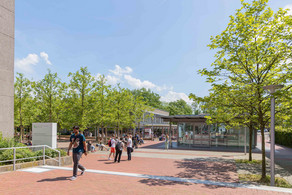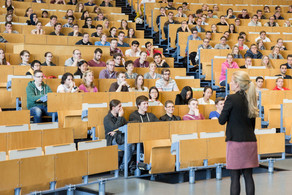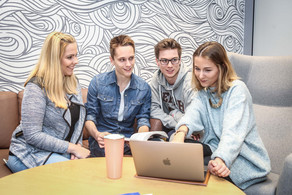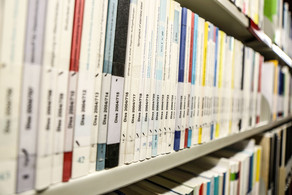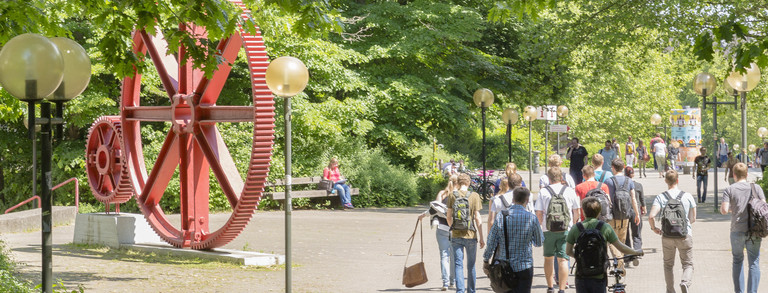Prof. Dr. Thomas Goll
Research
Current projects
PoJoMeC (= politics, journalism, media - concepts of children of preschool and elementary school age) (2021-2024)
(together with Eva-Maria Goll, Gudrun Marci-Boehncke, Raphaela Tkotzyk, Michael Steinbrecher, Lisa-Barbara Koenig and Laura Millmann)
The interdisciplinary research project PoJoMeC collects empirically well-founded knowledge of media and democracy education in (early) childhood as part of a longitudinal consideration. Three disciplines work together: political didactics, german / media didactics and journalism research.
Literature: i.a. Abendschön, S. & Vollmar, M. (2007): Kinder, Politik und die Zukunft der Demokratie: Können Kinder Demokratie leben lernen? In: van Deth et al. (Hrsg.): Kinder und Politik. Politische Einstellungen von jungen Kindern im ersten Grundschuljahr. VS Verlag für Sozialwissenschaften, Wiesbaden, S. 205–223; Astudo, J. & Ruck, M.D. (2010): Early Childhood as a Foundation for Civic Engagement. In: Sherrod, L.R., Torney-Purta, J. & Flanagan, C.A. (Hrsg.): Handbook of Research on Civic Engagement in Youth. John Wiley & Sons, Inc., Hoboken, New Jersey, S. 249-275; Aufenanger, S., Mertes, K. & Nold, F. (2006). Verstehen Kinder Kindernachrichten? Televizion, 19, 50-53; Berti, A.E. (2005): Children's understanding of politics. In: Barrett, M. & Buchanan-Barrow, E. (Hrsg.): Children's Understanding of Society. ProQuest Ebook Central, S. 69-103; Conway, M. M., Wyckoff, M. L., Feldbaum, E. & Ahern, D. (1981). The News Media in Children's Political Socialization. Public Opinion Quarterly, 45, S. 164-178; Gunter, B., Furnham, A. & Griffiths, S. (2000). Children's Memory for News: A Comparison of Three Presentation Media. Media Psychology, 2(2), S. 93-118; Marci-Boehncke, G. & Rath, M. (2013): Kinder – Medien – Bildung: Eine Studie zu Medienkompetenz und vernetzter Educational Governance in der Frühen Bildung. München: kopaed; Steinbrecher, M. (2006): Politische Partizipation in Deutschland. Baden-Baden: Nomos.
DeFaKi (= democracy facets among children) (2021-2013)
(in cooperation with Norbert Zmyj)
In recent years, many programs for democracy education have become established in preschool age without, however, having a sound knowledge of whether the children (can) understand the content of these programs at all. In this project, we investigate the development of understanding of essential features of a democratic constitutional state among preschool children (3 to 5 year olds, 64 children per age group). The 1st sub-project DiFaKi_01 is about understanding majority decisions.
Literature: Corriveau, K.H., Fusaro, M. & Harris, P.L. (2009): Going With the Flow. Preschoolers Prefer Nondissenters as Informants. In: Psychological Sience (20), 3, S. 372-377; Goll, Thomas (2021): Junge Kinder und Politik – keine Tabula rasa. In: Thema Jugend, H. 2, S. 3-5; Zmyj, N. (2021): Demokratiepädagogik in der Kindertagesstätte –
eminenz- oder evidenzbasiert? In: Goll, T. & Schmidt, I. (Hrsg.): Politische Bildung von Anfang an? Kindertageseinrichtungen und Grundschulen als Orte politischer Bildung und demokratischen Lernens. Bad Heilbrunn: Verlag Julius Klinkhardt, S. 87-107.
PBKS (= Civic Education from the Beginning (Daycare Centers and Non-Fiction Education)) (2019/2021-2023)
(Funding: Federal Agency for Civic Education)
The project PBKS (= Politische Bildung von Anfang an (Kindertagesstätten und Sachunterricht)) addresses the need to think of democratic learning and political education as interrelated lifelong learning and to relate the institutional places of this learning more strongly than before in the transition from preschool to school-based political education. In the field of cooperation between (elementary) school and preschool civic education, first of all opportunity structures have to be clarified and cooperation formats have to be conceptualized. However, because there is uncertainty about actually possible cooperation projects as long as a substantiated conversation between all potential participants has not taken place, the project will start on December 2-3, 2019 with a conference for the purpose of clarifying and sounding out possible fields of cooperation and cooperation partners. Overall, the project is designed as a fact finding mission and best practice exploration and is estimated to run for three years.
Literature: Deth, J.W. v., Abendschön, S., Rathke, J. & Vollmar, M. (2007). Kinder und Politik. Politische Einstellungen von jungen Kindern im ersten Grundschuljahr. Wiesbaden: Springer VS; Götzmann, A. (2015). Entwicklung politischen Wissens in der Grundschule. Wiesbaden: Springer VS; Hansen, R., Knauer, R. & Sturzenhecker, B. (2011): Partizipation in Kindertageseinrichtungen. So gelingt Demokratieerziehung mit Kindern. Bonn; Richter, D. (Hrsg.) (2007): Politische Bildung von Anfang an. Bonn.
PKjK (= Political Concepts of Young Children) - explorative sub-study in the PBKS project.
According to the United Nations Convention on the Rights of the Child (CRC), every child "who is capable of forming his or her own opinion" (Art. 12 CRC; BMFSFJ 2014) has the political right to participation. Taking this legal right seriously also means supporting children as well and as early as possible in becoming capable of political judgment and action. However, empirical studies have not yet clarified when this support can and should begin. This is where the PKjK study (= Political Concepts of Young Children) of the Chair for Integrative Subject Didactics of Physical Education and Social Sciences at the TU Dortmund University comes in. It investigates whether children of kindergarten age already possess polical literacy and conceptual political knowledge.
The study was conducted as part of the project "Civic Education from the Beginning (Daycare Centers and Non-Fiction Education)" (= PBKS) in the fall of 2019 at the TU Dortmund University. The research question was whether children as young as 5 years old have political literacy and which characteristics can be demonstrated. For this purpose, two video files of the regional TV station Rhein-Main TV (Kinder erklären Politik 1 und 2) accessible via Youtube were analyzed using qualitative content analysis according to Mayring (2010). Despite the limited nature of the data, the study was able to confirm that even young children can possess political literacy at least at the basal competence levels nominally and functionally. This means that political terms are also known to young children and can be used correctly by them. It also became clear that a variety of material and methodological approaches are necessary to better track down children's ideas.
The results can be found here: Thomas Goll: Politische Konzepte junger Kinder – Ergebnisse einer explorativen Teilstudie. Working Paper. Dortmund 2020 DOI: 10.13140/RG.2.2.32302.13129.
The Chair of Integrative Subject Didactics of Physical Education and Social Sciences at the TU Dortmund University will therefore continue the PKjK project and expand the data base by creating a collection of political statements of young children.
Literature: Berti, A.E. (2005): Children's understanding of politics. In: Barrett, M. & Buchanan-Barrow, E. (Hrsg.): Children's Understanding of Society. ProQuest Ebook Central, 69-103; Bybee, R. (1997). Towards an understanding of scientific literacy. In W. Gräber, & C. Bolte (Hrsg.), Scientific Literacy. An international symposium. Kiel: IPN, 37-68; Sapiro, Virginia (2004): Not your Parents’ political Socialisation: Introduction for a New Generation. In: Annu. Rev. Polit. Sci. 2004. 7:1–23 (doi: 10.1146/annurev.polisci.7.012003.104840).
POWIS Q: "Political knowledge of students with and without migration background - qualitative sub-study on political concepts (2012-2021).
(together with Michaela Hartmann)
The design of the sub-study POWIS-Q follows a mixed methods approach. The tested standardized instruments from POWIS I and II are combined with non-standardized methods. Students from selected secondary schools in North Rhine-Westphalia will be tested using the questionnaires tested in POWIS I and II - extended by specific questions on their understanding of fundamental rights - in order to verify the findings from POWIS I and II (replication study of POWIS I). On the basis of the results, selected students from the tested classes are specifically interviewed a second time using sound-thinking procedures in order to understand their thought processes leading to a response behavior in the form of a specific voting decision. These thought processes are documented and evaluated in terms of the underlying political concepts. For this purpose, the breadth and depth of the argumentation (following Toulmin 1996) will be used, which at the same time could enable conclusions to be drawn about possible consolidation of pre- and everyday concepts in learners. This approach can be connected, for example, to the theoretical construct of "narrative argumentation" in mathematics didactics (Krummheuer 1997) as well as to research on the importance of argumentation in other subject didactics (e.g. Aufschnaiter 2008; Mittelsten Scheid 2008; Zohar / Nemet 2002), but also to recent work in political didactics on the importance of argumentation in the context of political agency (see Weißeno / Buchstein 2012). The focus here is on the learner perspective, not on the professional research of prospective teachers.
Literature: Aufschnaiter, Claudia von / Erduran, Sibel / Osborne, Jonathan / Simon, Shirley (2008): Arguing to learn and learning to argue: Case studies of how students' argumentation relates to their scientific knowledge. In: Journal of Research in Science Teaching, 45, S. 101–131; Krummheuer, Götz (1997): Narrativität und Lernen. Mikrosoziologische Studien zur sozialen Konstitution schulischen Lernens. Weinheim; Mayring, Philipp (2010): Qualitative Inhaltsanalyse. Grundlagen und Techniken. Weinheim; Mittelsten Scheid, Nicola (2008): Niveaus von Bewertungskompetenz. Eine empirische Studie im Rahmen des Projektes Biologie im Kontext. Tönning; Toulmin, Stephen Edelston (1996): Der Gebrauch von Argumenten. Weinheim; Weißeno, Georg / Buchstein, Hubertus (Hrsg.) (2012): Politisch Handeln. Modelle, Möglichkeiten, Kompetenzen. Opladen; Zohar, Anat / Nemet, Flora (2002): Fostering students’ knowledge and argumentation skills through dilemmas in human genetics. In: Journal of Research in Science Teaching, 39 (1), S. 35-62.
PIK: "Politics in Boxes" (2013-continuing).
(together with Eva-Maria Goll (born Schauenberg))
The explorative project "Politics in Boxes" takes up the idea of learning with the help of thematic boxes, which has been tested in the didactics of natural science subjects or the corresponding perspective of physical education, for research in the social science perspective of physical education. Another point of reference with regard to the subject area of politics are university "politics labs" (e.g. in Oldenburg and Hannover). The particular problem in the development of policy boxes is that objects for experimentation can easily be packed into boxes, but not so "objects of policy". The central question for the project is therefore about the possibilities and limits of child-oriented political learning with topic boxes. The project specifically investigates whether and to what extent a learning process can be initiated and recorded with the help of political boxes (e.g. on democracy, political parties, the EU and children's rights). The documentation of the working and learning process is done by videography.
The project is based on the following assumptions: "Objects of politics" are difficult to pack into boxes, but perspective-based learning (competence dimension subject knowledge) is still possible in PIK lessons, because students' prior knowledge about politics is basically available (= pre-concepts). This knowledge varies, but it is higher than often assumed (cf. Richter 2007). The learning possibilities with the material depend strongly on the general reading and language competence, since politics is bound to language (cf. Goll et al. 2010), but the material promotes the interest of students who are not so strong in language through the associated action orientation. If the work with the material is accompanied by trained observers, it can also be used as a diagnostic tool.
Literature:: Detjen, Joachim (2012): Politikkompetenz – ein Modell. Wiesbaden; Goll, Thomas u.a. (2010): Politisches Wissen zur Demokratie von Schülerinnen und Schülern mit und ohne Migrationshintergrund (POWIS-Studie). In: Weißeno, Georg (Hrsg.): Bürgerrolle in der Einwanderungsgesellschaft – Chancen des Politikunterrichts. Bonn, S. 23-50; Richter, Dagmar (2007): Welche politischen Kompetenzen sollen Grundschülerinnen und -schüler erwerben? In: Dies. (Hrsg.): Politische Bildung von Anfang an – Demokratie-Lernen in der Grundschule, Bonn, S. 36-53.
Completed Projects
POWIS I - Political Knowledge of Pupils with and without Migration Background - Study on Basic Political Education (2008-2010)
(together with Dagmar Richter, TU Braunschweig, Georg Weißeno and Valentin Eck, PH Karlsruhe; funding: Federal Agency for Civic Education)
Surveys on young people's political attitudes toward democracy and society show different results for young people with and without a migration background. It is unclear whether these differences are the result of a different understanding of politics and democracy, or whether they are due to incomplete knowledge or language skills. To date, no empirical studies have been conducted in this area. The POWIS I project provides initial answers. Data were collected on the conceptual knowledge of students who are taught in teaching/learning groups with a multiethnic composition.
Methodological approach: For pragmatic (scope of the study) and content-related reasons (medium level of education, avoidance of ceiling or base effects), the survey was limited to students in grade 9 in Realschulen. Furthermore, the proportion of students with a migration background in the sample was to correspond to the national average. Due to the universities involved, the schools were located in the metropolitan areas of Braunschweig, Dortmund and Karlsruhe. The survey period was spring 2008.
The test was for conceptual knowledge. The students were asked to show how they judged certain situations on the basis of their knowledge, but not what individual facts were available. The knowledge test contained questions on various aspects of content - democracy, elections, federalism and civil rights - and with varying degrees of difficulty. The comprehensibility and solvability of the questions were examined in two preliminary pilot tests. The format used was the standard multiple-choice format: 4 answer options with one correct solution. Furthermore, the questions should be curricular sensitive and thus replicable in all states. To this end, the questions were subjected to an expert review by 16 experts to assess curricular validity. The knowledge test was framed by two language tests, which were supposed to provide indications of language ability in order to exclude the possibility of confusing language effects with knowledge. Data collection was conducted in a total of 82 school classes.
Measurement Model: It is important for understanding POWIS I that the measurement of the data was based on a multi-factorial model. This does not look at response behavior to individual questions, but in the measurement model, response behavior is controlled for all questions simultaneously according to the Item Response Theory (IRT). Two assumptions were made and checked for item selection: Unidimensionality (all knowledge questions in all subfacets go back to a common ability) and group-specific measurement invariance (the measurement model is independent of the "group membership" of the individuals).
Analysis model: For the analysis a multilevel model was used, which allows to determine the influence of several independent variables (= predictors), on the dependent variables (= criterion variables). Thus, school classes could be considered as aggregate units and not only individuals, because students were not interviewed as individuals but as members of a school class.
In the analysis model, the following predictors of individual-level political knowledge were used in POWIS I: Gender; Parental Cultural Capital; Parental Migration Origin; Language(s) at Home; and Language Test. The factors influencing class-level knowledge were: Class size and individual-level aggregates (number of books, parents' origin, languages spoken at home, performance on the language test as a formative latent variable from the two test scores).
Results: Successful learning in the politics classroom also depends on the context (e.g., class composition). At both the individual and class levels, the importance of students' language competence and parents' cultural capital is evident. It is noticeable that political education needs to work more on language skills (e.g., through written assignments) and to focus attention on students with Turkish or Italian immigrant backgrounds. Here the results are not satisfactory.
Publication: Politisches Wissen zur Demokratie von Schülerinnen und Schülern mit und ohne Migrationshintergrund (POWIS-Studie). In: Weißeno, Georg (Hrsg.): Bürgerrolle in der Einwanderungsgesellschaft – Chancen des Politikunterrichts. Bonn 2010, S. 23-50 (zusammen mit Valentin Eck, Dagmar Richter und Georg Weißeno).
POWIS II - The Development of Political Knowledge among Students in Lower Secondary Schools - Longitudinal Study (2009-2013).
The establishment of educational standards in school-based civic education presupposes that empirically validated statements can be made about actual learning progression in the subject, because "educational standards concretize goals in the form of competency requirements. They specify the competencies a student must possess if important school goals are to be considered achieved. These requirements are systematically organized in competency models that represent aspects, gradations and developmental trajectories of competencies" (BMBF 2003, 21). In order to be able to empirically prove such "developmental trajectories," longitudinal studies are needed. However, these are a desideratum in political didactics. The POWIS II study provides first insights into the development of students' conceptual political knowledge and the share of political education in it.
Methodological approach: POWIS II was conducted in cooperation with the Institute for School Development Research at the TU Dortmund University and participates in the PARS project of the Research School "Education and Capabilities" at the University of Bielefeld and the TU Dortmund University. The longitudinal PARS study (Panel Study at the Research School "Education and Capabilities" in North Rhine-Westphalia) collects data at 50 schools in North Rhine-Westphalia (8 Hauptschulen, 10 Realschulen, 15 Gymnasien, 4 Gesamtschulen, 13 Förderschulen) annually from 2009 to 2013. The survey is conducted in two cohorts (Cohort I: from grade 5; Cohort II: from grade 9). Among other things, test instruments from NEPS (National Educational Panel Study) are used, as well as eight tested questions each from POWIS I in the area of political knowledge, some of which have been linguistically adapted to the grades.
The learning progression of the curricula serves as the basis for the hypothesis that, depending on the type of school, systematic knowledge transfer in the subject of civic education takes place in school. Conceptual knowledge at a certain point in time can be tested with the proven instruments from POWIS I. If the same instruments are used to test the same students at different points in their school careers, then statements can be made about the course of their knowledge acquisition. The test results can be used to calculate effect sizes (d). If the measured values are above the "natural" increase in knowledge (Hattie), then the political education has contributed to the formation of conceptual political knowledge.
Measurement model: data will be measured based on a multi-factorial model. It is not the response behavior to individual questions that is considered, but in the measurement model, the response behavior for all questions is controlled simultaneously according to the Item Response Theory (IRT) (see POWIS I).
Analysis model: in the analysis model, the following predictors of political knowledge were used in POWIS II: Gender; Parents' cultural capital (number of books), Parents' migration origin, and School type.
Results: Successful learning in political education depends significantly on the type of school attended. This is in part more significant than, for example, gender and migration background (12% variance explanation in grade 7). In each school type, knowledge is imparted in political instruction or in the subject of civic education, albeit to varying degrees (from grade 5 to 7: Hautschule/Realschule d = 0.28 p.a.; Gymnasium d = 0.50 p.a.). High school students seem to benefit the most from political education. The increase in political knowledge cannot be explained by extracurricular factors alone (e.g., media use), nor by the students' cognitive development (d > 0.15 p.a.). It can be assumed that there is a connection between the learning requirements of the guidelines and the learning growth (cf. increase in the Realschulen to d = 0.34 p.a. from grade 7 to 9 according to the progression of the guidelines). However, it is not clear which form of political education is particularly conducive to learning (e.g., methods, use of media).
Publication: Powis II: Die Entwicklung politischen Wissens bei Schülern in der Sekundarstufe I - ein Zwischenbericht. In: Juchler, Ingo (Hrsg.): Unterrichtsleitbilder in der politischen Bildung (= Schriftenreihe der Gesellschaft für Politikdidaktik und politische Jugend- und Erwachsenenbildung, Bd. 11). Schwalbach/Ts.: Wochenschauverlag 2012, S. 139-152; Die Entwicklung des politischen Wissens bei Schülern/innen in den Schulformen der Sekundarstufe I (POWIS II) – Ergebnisse einer Längsschnittstudie. In: Lange, Dirk, Oeftering, Tonio (Hrsg.): Politische Bildung als lebenslanges Lernen (= Schriftenreihe der Gesellschaft für Politikdidaktik und politische Jugend- und Erwachsenenbildung, Bd. 13). Schwalbach/Ts.: Wochenschauverlag 2014, S. 125-137.
Evaluation of the Media Project HANISAU-Land of the Federal Agency for Civic Education (2011-2012).
The evaluation, commissioned by the Federal Agency for Civic Education, was intended to provide information on a possible conceptual variation of HANISAU-Land. The evaluation was conducted in two work phases: 1. media analysis of the existing HANISAU-Land materials; 2. user analysis and user survey. Specific questions included the suitability of the materials for teaching and their dissemination in the school context.
The results were presented to the Federal Agency for Civic Education in 2012 and were incorporated into the further development of HANISAU-Land.
Co-Teaching International: Teacher Training in Intercultural and Interreligious Dialogue (2015-2017).
(together with Heike Wendt, scientific director, and Hasan Sinemillioglu, project coordinator; funding: DAAD)
The Project is carried out with the partnership of TU Dortmund University and Dicle University. The aims of the project are;
- to promote the development of global and intercultural competences of student teachers and teacher educators,
- train both groups in pedagogic, scientific approaches and help them to reflect on global and intercultural competences,
- support learners in acquiring these skills.
In order to materialise these aims; jointly developed and taught courses are simultaneously being run at the two teacher education institutions. Also, student exchange that includes a group of students from Dicle University attending an intensive one week course jointly with German students in Dortmund and vice versa. Staff exchange and capacity building which involves the enhancement of young researchers’ skills through research method courses are also important element of the project.
Project homepage: www.coteach.org/moodle/
PhaSE1 (Break helper in schools - project to promote first aid skills of primary school pupils (cooperation project with ASB Dortmund)) (2017-2018):
The project PhaSE1 accompanied and evaluated the concept developed by ASB Dortmund: "Pausenhelferdienst an Grundschulen". In an explorative intervention study, first the knowledge of the pupils participating in the project regarding first aid was surveyed, then the project implementation was accompanied and evaluated, and finally the learning effects through the project participation were surveyed after the end of the project. The goals of the explorative study were to improve the concept and to develop standardized instruments for a broad-based effectiveness study.
The project was presented at the 2018 GDSU Annual Meeting. The results are published in the GDSU Journal 2019 (http://www.gdsu.de/gdsu/wp-content/uploads/2019/07/154_163_9.pdf).
"DoProfiL - The Dortmund Profile for Inclusion-Oriented Teacher Education" (2016-2019).
Subproject: Making diversity aspects a topic - Perspectives of subject didactics of non-fiction education.
(together with Dörte Kanschik; funding: BMBF).
"DoProfil" aims at qualifying student teachers and teachers to recognize special needs of students and to deal with them appropriately - for example, through learning opportunities that create accessibility for all learners. To this end, new subject-specific as well as interdisciplinary concepts and event formats are being developed at TU Dortmund. All student teachers should learn about the inclusive handling of diversity both theoretically and experience it in university courses, as well as practically test it and reflect on it. In particular, dialogical teaching/learning formats are developed. Inclusion is understood broadly and includes, for example, general/subject-specific cognitive knowledge, from learning difficulties to giftedness, ethnic origin, social and economic status as well as physical impairments or special learning needs.
The subproject aims to make diversity aspects visible and thus workable for students (and teachers) on two levels.
At the level of higher education, on the one hand, inclusion didactic issues are integrated into the curriculum of the subject of subject-specific education in a way that is binding for all students (M2). This is done both by establishing a separate course (Inclusive Sachunterricht) and by integrating inclusive didactic questions into other courses. For this purpose, an analysis tool is to be developed that both identifies already existing potentials for inclusive subject teaching and points out possibilities for development in this regard.
At the level of subject didactics, the aim is to discuss and further develop the subject's own potential for inclusion. Social studies offers the opportunity to make diversity aspects a subject of instruction and thus to enrich and differentiate children's ideas about social phenomena. However, research results on science education point to a predominance of natural science topics and (in the context of the social science components) to a reduction to elements of social learning (cf. Schroeder 2015). Addressing this desideratum, subject didactic seminars on selected diversity aspects are to be offered over several semesters and evaluated with regard to adaptive teaching/learning situations (M1). One of the issues will be how to make diversity a topic of instruction "without providing a stage for the portrayal of stereotypes" (Offen 2014, 6).

